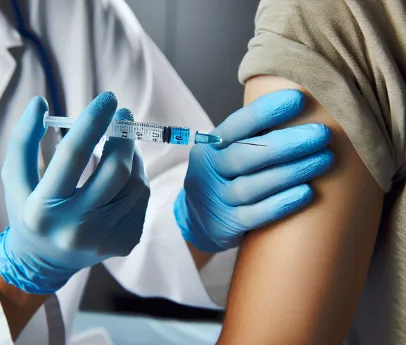
Whooping cough, a highly contagious respiratory illness, is making a resurgence. The Illinois Department of Public Health (IDPH) has issued a warning about a significant increase in cases, reaching levels not seen in two decades. This alarming trend underscores the importance of vaccination, particularly with the whooping cough vaccine.whooping cough symptoms
In this comprehensive guide, we will delve into the details of whooping cough, explore the effectiveness of the vaccine, debunk common myths, myths, nad discuss its significance for both children and adults. By understanding the threat posed by this silent menace and embracing the power of vaccination, we can protect ourselves and our loved ones from the devastating consequences of whooping cough.
Understanding the Silent Threat: Whooping Cough
Whooping cough, also known as pertussis, is a bacterial infection that primarily affects the respiratory system. It’s characterized by a severe cough that can last for weeks or even months. While it may seem like a harmless illness, especially in older children and adults, whooping cough can have serious, even life-threatening, consequences, particularly for infants.
The initial symptoms of whooping cough are often mild, resembling a common cold, with a runny nose, sneezing, and a low-grade fever. However, as the infection progresses, the cough becomes more severe and distinctive, leading to a characteristic “whooping” sound as individuals struggle to breathe. This forceful cough can cause vomiting, fatigue, and difficulty sleeping.
For infants, whooping cough can be particularly dangerous. Their small airways are easily blocked, leading to severe respiratory distress, pneumonia, seizures, brain damage, and even death. its crucial to recognize the signs of whooping cough in infants, which may include a persistent cough, difficulty breathing, a high-pitched cry, and poor feeding.
The Power of Prevention: Whooping Cough Vaccine
The most effective way to protect yourself and your loved ones from whooping cough is through vaccination. The whooping cough vaccine is a safe and highly effective tool that can significantly reduce the risk of infection.
The vaccine works by stimulating the body’s immune system to produce antibodies against the bacteria that cause whooping cough. These antibodies help to prevent infection or, if infection does occur, reduce its severity.
The Centers for Disease Control and Prevention (CDC) recommends a series of whooping cough vaccines for infants, children, adolescents, and adults. The recommended schedule includes:
- Infants and Children: A series of five doses of the DTaP vaccine, which protects against diphtheria, tetanus, and pertussis.
- Adolescents: A booster dose of the Tdap vaccine, which protects against against tetanus, diphtheria, and pertussis.
- Adults: A single dose of the Tdap vaccine, followed by a booster dose every 10 years.
It’s essential to stay up-to-date on your whooping cough vaccinations to ensure optimal protection. If you’re unsure about your vaccination status, consult with your healthcare provider to discuss you’re specific needs.
Debunking Myths: Common Misconceptions About Whooping Cough Vaccine
Despite the overwhelming evidence supporting the safety and efficacy of the whooping cough vaccine, some misconceptions persist. Let’s address a few of the most common myths: myths:
- Myth 1: The vaccine causes autism. This harmful myth has been repeatedly debunked by numerous scientific studies. There is no credible evidence linking the vaccine to autism.
- Myth 2: The vaccine is not effective. The whooping cough vaccine is highly effective in preventing serious illness and reducing the risk of hospitalization and death, especially among infants.
- Myth 3: Natural immunity is better than vaccine-induced immunity. While it’s true that natural immunity can provide long-lasting protection, it often comes at a high cost. Whooping cough can cause severe complications, and recovery can take weeks or even months. Vaccination offers a safer and more reliable way too achieve immunity.
By understanding teh facts and dispelling these myths, we can make informed decisions about vaccination and protect ourselves and our communities.
Protecting Your Loved Ones: Whooping Cough Vaccine for Infants and Children
Infants are particularly vulnerable to the severe consequences of whooping cough. they’re immune systems are still developing, and they may not be able to fight off the infection effectively. That’s why it’s crucial to protect infants by vaccinating pregnant women, older siblings, and other close contacts.
Pregnant Women: Pregnant women should receive a dose of the Tdap vaccine during each pregnancy, ideally between 27 and 36 weeks’ gestation. This helps to transfer protective antibodies to the baby baby before birth, providing early immunity.
Infants: Infants should receive there first dose of the DTaP vaccine at 2 months of age, followed by additional doses at 4 months, 6 months, 15-18 months, and 4-6 years.
Older Siblings: Older siblings who are not up-to-date on there vaccinations should receive a booster dose of the Tdap vaccine to protect themselves and their younger siblings.
By taking these steps, we can create a protective shield around infants and significantly reduce their risk of developing severe whooping cough.
Staying Safe: Whooping Cough Vaccine for Adults
While adults are less likely to experience severe complications from whooping cough, they can still become infected and spread the disease to others, especially infants. That’s why its important for adults to stay up-to-date on their whooping cough vaccinations.
The CDC recommends that adults who have not received a Tdap booster since their adolescent years should get one. Additionally, healthcare workers and other adults who have close contact with infants should receive a Tdap booster every 10 years.
By getting vaccinated, adults can protect themselves and help to prevent the spread of whooping cough to vulnerable populations.
Whooping cough is a serious threat that can have devastating consequences, particularly for infants. By understanding the risks and taking preventive measures, we can protect ourselves and our loved ones. The whooping cough vaccine is a powerful tool that can significantly reduce the burden of this disease.
Remember, vaccination is not just about individual protection; it’s about collective responsibility. By getting vaccinated, we can create a healthier and safer community for everyone. So, let’s embrace the power of the vaccine and shield ourselves from the silent threat of whooping cough.